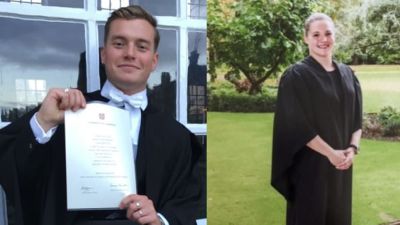Fishmongers’ Hall: Jury retires in inquest into terror attack deaths at London Bridge

A jury has retired to consider whether any “omission or failure” played a part in the deaths of two young people who were stabbed to death by a convicted terrorist at London's Fishmongers’ Hall.
Jack Merritt, 25, and Saskia Jones, 23, were fatally stabbed by Usman Khan at an alumni event for Cambridge University’s Learning Together offender educational organisation in London on November 29 2019.
Over six weeks, a jury at the Guildhall in London has heard first-hand accounts of the attack and witnesses outlining authorities’ dealings with Khan beforehand.
On Thursday, Coroner Mark Lucraft QC summed up the evidence before sending the jury out to consider conclusions on the deaths of Mr Merritt and Ms Jones.
The coroner told jurors to complete a questionnaire containing five questions.
In it, the jury was directed by the coroner to find the victims were killed unlawfully.
The second question deals with the basic facts surrounding their deaths.
The jury was told to consider whether any “omission or failure” in the lead-up to the attack contributed to the victims’ deaths.
This related to the management of Khan in the community as well as information-sharing and guidance about him.
The final question focused on security measures for the Fishmongers’ Hall event and its organisation.
Previously, the inquest heard how Khan, 28, from Stafford, spent eight years in jail for plotting to set up a terror training camp in Pakistan.
He was released into the community 11 months before the attack under strict licence conditions.
Fishmongers’ Hall attack witness describes coming face to face with terrorist
Doctor recalls ‘urgency on the face of police’ at Fishmongers’ Hall attack
Throughout that time he was managed by probation officers and subject to Multi-Agency Public Protection Arrangements (Mappa).
He was also being covertly investigated by MI5 and police, jurors have heard.
The inquest has heard that Khan was allowed to attend the Fishmongers’ Hall event unaccompanied, despite signs he was becoming increasingly isolated and had failed to find employment.
Khan travelled to London by train and is believed to have put on a fake suicide vest under his bulky jacket on the way.
He strapped two knives to his hands in the men’s toilets at the venue then fatally stabbed Cambridge graduates Ms Jones and Mr Merritt and injured three others.
He was forced on to London Bridge by delegates armed with makeshift weapons and shot dead by police.
Earlier in his summing up, Mr Lucraft said: “At the heart of these inquest hearings are two young lives that were lost when Usman Khan launched his attack on 29 November 2019.
“It is clear from what we have heard that both Jack and Saskia’s lives enriched those around them. Their lives were tragically cut short.
“Each of Jack and Saskia had demonstrated a profound commitment to the good of society: Jack, through his work on education and rehabilitation of offenders, and Saskia, through her research work in the field of sexual violence and her concerns for victim support in the justice system.”
He highlighted evidence of “remarkable courage and compassion”, saying the three men who tackled Khan with a narwhal tusk and fire extinguisher had acted with “great bravery”.
Members of the public and emergency services went to the aid of the injured and firearms officers dealt with Khan at “close quarters”.
Mr Lucraft added: “Lives were saved as well as lost in this terrible attack.”
The jury began its deliberations on Thursday at 2.17pm.